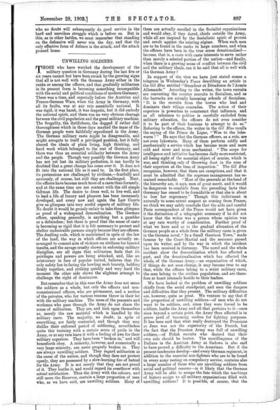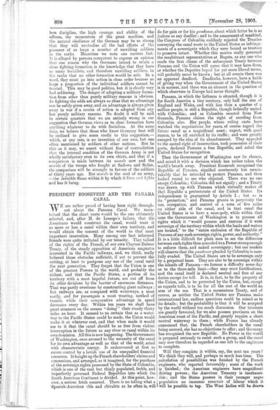UNWILLING SOLDIERS. T HOSE who have watched the development of the
military question in Germany during the last five or six years cannot but have been struck by the growing signs that all is not well with the German Army either in the ranks or among the officers, and that gradually militarism in its present form is becoming something incompatible with the social and political conditions of modern Germany. There was a time, and especially before the Austrian and Franco-German Wars, when the Army in Germany, with all its faults, was at any rate essentially national. It was rigid, it was harsh, it was despotic, but it did embody the national spirit, and there was no very obvious cleavage between the civil population and the great military machine. The frugality, the dutifulness, the dogged if rather dull thoroughness which in those days marked the Mass of the German people were faithfully reproduced in the Army. The German military caste might be disagreeable, and might arrogate to itself a privileged position, but it fully shared the ideals of plain living, high thinking, and hard work which belonged to the rest of Germany, and there was thus an essential solidarity between the Army and the people. Though very possibly the German Army has not yet lost its military perfection, it can hardly be doubted that a great change has come over it. It does not fit into the national life as it used to. In the first place, its pretensions are challenged by civilians,—fearfully and anxiously, of course, but still they are challenged. Next, the officers have become much More of a caste than formerly, and at the same time are not content with the old simple German life. The desire to .dress well, to live well, and to lead a life of luxury and pleasure has been immensely developed, and every now and again the Law Courts give us glimpses into very sordid aspects of military life. No doubt it would be grossly unfair to take these glimpses as proof of a widespread demoralisation. The German officer, speaking generally, is anything but a gambler or a debauches; but there is proof that the sense of caste is becoming so rigid that it is felt necessary to protect and shelter undesirable persons simply because they are officers. The duelling code, which is maintained in spite of the law of the land, the way in which officers are actually en- couraged to commit acts of violence on civilians for fancied insults, and the savage cruelty shown in enforcing military discipline, are all signs that militarism feels that its privileges and. powers are being attacked, and, like an aristocracy in face of popular hatred, believes that the only safety lies in facing the howling mob bravely, holdirr, firmly together, and striking quickly and very hard the moment the other side shows the slightest attempt to challenge the right of dominance.
But remember that in this case the Army does not mean the soldiers as a whole, but only the officers and non- commissioned officers, who are permanent, and a section of the privates, who for various reasons throw in their lot with the military machine. The mass of the peasants and workmen who pass through the Army do not share the sense of militarism. They are, and look upon themselves as, merely the raw material which is handled by the military caste. The majority, no doubt, in spite of everything, are fairly contented, and though they may dislike their enforced period of soldiering, nevertheless quite thir training with a certain sense of pride in the Army, or at any rate leave it with a feeling of awe for their military superiors. They have been "broken in," and will henceforth obey. A minority, however, and numerically a very large minority, are never properly broken in. They are always unwilling soldiers. They regard militarism as the curse of the nation, and though they dare not protest openly, they are possessed by a slow-burning fire of hatred for the Army. It is not merely that they are not proud of it. They loathe it, and would regard its overthrow with actual satisfaction. Thus the Army with the colours, and still more the Reserves, contain a large proportion of men who, as we have said, are unwilling soldiers. Many of them are actually enrolled in the Socialist organisations and would obey, if they dared, chiefs outside the Army, while all are inspired by the Socialistic spirit of protest and revolt against the existing r&ime. When such men are to be found in the ranks in large numbers, and when the officers have been in the true sense denationalised— become, that is, a caste with caste interests to serve rather than merely a selected portion of the nation—and finally, when there is a growing sense of conflict between the civil and the military ideals, can it be said that all is well with the German Army ?
In support of the view we have just stated comes a telegram in Wednesday's Times describing an article in the Gil Bias entitled "Grandeur et Thicadenee de l'Armie Allemande." According to the writer, the town recruits are converting the country recruits to Socialism, and so the barracks are actually becoming schools of Socialism. "it is the recruits from the towns who lead and dominate their village comrades. The action of their superiors is powerless to counteract that influence, and as all reference to politics is carefully excluded from military education, the officers do not even consider it to be part of their business to attempt to do so." Referring to the officers, the writer in the Gil Blatt recalls the saying of the Prince de Ligne, "Woe to the luke- warm ! " He says that the German officers, as a rule, are not even lukewarm. Many of them perform coldly and mechanically a service which has become more and more cold and more and more mechanical. "The scope for intelligence and initiative has become daily more restricted, all losing sight of the essential object of armies, which is war, and thinking only of throwing dust in the eyes of their superiors at the time of inspection." The Gil Bias recognises, however, that there are exceptions, and that it must be admitted that the supreme management has re- mained remarkable. "Most of the generals at the head of the hierarchy are, it says, men of great merit, and it would be dangerous to concluee from the preceding facts that Germany has ceased to be formidable or that she is about to lose her supremacy." Though this indictment is naturally to some extent suspect as coming from France, we think we may safely conclude that the able and careful Paris correspondent of the Times would not have given it the distinction of a telegraphic summary if he did not know that the writer was a person whose opinion was at any rate worthy of consideration. Further proof of what we have said as to the gradual alienation of the German people as a whole from the military caste is given in the German novel," In a Small Garrison Town," made famous by the Court-Martial and the sentence passed upon its writer, and by the way in which the incident has been received in Germany. The novel and the whole incident show the demoralisation which has affected a part, and the denationalisation which has affected the whole, of the German Army,—an organisation of which. if things do not soon change, it may become true to say that, while the officers belong to a strict military caste, the men belong to the civilian population, and are there- fore at heart intensely hostile to their leaders.
We have looked at the problem of unwilling soldiers chiefly from the social standpoint, and seen the dangers and difficulties that they present. The military difficulties are, however, quite as great. We venture to say that if the proportion of unwilling soldiers—of men who do not want to be soldiers, and, since they were forced to be soldiers, loathe the Army and all that pertains to it—once rises beyond a certain point, the Army thus affected is in grave peril of becoming useless for fighting purposes. It has been said that what really destroyed the Prussians at Jena was not the superiority of the French, but the fact that the Prussian Army was full of unwilling soldiers,—of Polish recruits who desired that their own side should be beaten. The unwillingness of the Italians in the Austrian Army at Sadowa is also said to have proved a difficulty to the Austrians. But if the present tendencies develop—and every German regiment, in addition to the essential non-fighters who are to be found in every army resting on compulsory service, contains also a large number of those who are unwilling soldiers from social and political reasons—is it likely that the German Army will be able to escape the fate which the teachings of history assign to all military organisations filled with unwilling soldiers ? It is possible, of course, that the iron discipline, the high courage and ability of the officers, the momentum of the great machine, and the natural obedience of the German may be so strong that they will neutralise all the bad effects of the presence of so large a number of unwilling soldiers in the ranks. Meantime we note one curious fact. It is alleged by persons competent to express an opinion that one reason why the Germans intend to retaiu a close fighting formation is the knowledge that they have so many Socialists, and therefore unwilling soldiers, in the ranks that no other formation would be safe. In a word, they must go into action in close order because so large a proportion of the individual soldiers cannot be trusted. This may be good politics, but it is clearly very bad soldiering. The danger of adopting a military forma- tion from other than purely military reasons is obvious. In fighting the odds are always so close that no advantage can be safely given away, and an advantage is always given away in war if a course of action is adopted from any but purely military reasons. No doubt it will be said in certain quarters that we are entirely wrong in our suggestion that German views as to close formation have anything whatever to do with Socialism. At the same time, we believe that those who know Germany best will be inclined to give some credit to this suggestion,— which, at any rate, is no invention of our own, but one often mentioned by soldiers of other nations. But be this as it may, we assert without fear of contradiction that the internal condition of the German Army is not wholly satisfactory even to its own chiefs, and that if a comparison is made between its morale now and the morale of the troops who fought at Sadowa and Sedan, the comparison will be strongly in favour of the soldiers of thirty years ago. But morale is the soul of an army, —the invisible flame within it by which it lives and fights and has it being.



















































 Previous page
Previous page